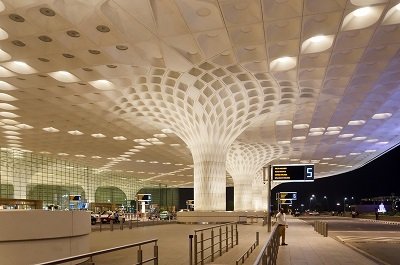Mumbai International Airport (MIAL), in its recently launched Sustainability Report 2016, highlighted that the Chhatrapati Shivaji International Airport (CSIA) achieved a 48% reduction in water consumption per million pax in 2015-16 as compared to 2013-14.
In the last three years, the number of flight arrivals and departures at Mumbai airport went up by 35,500 even as the fast-growing airport saw a 30% increase in passenger volumes, taking the number of passengers handled in FY 2015-16 to 4.15 crore. In FY 2013-14, the airport handled 2.18 crore domestic and 1.03 crore international passengers, with a total of 3.2 crore passengers. Three years later, the number of domestic passengers had gone up to 3 crore, while international passenger traffic was 1.16 crore.
CSIA rated as the world’s no. 1 airport for the year 2015 in 25-40 million passengers per annum category by Airport Council International, is a Public Private Partnership (PPP) and Joint Venture between Airports Authority of India (AAI) and GVK led Consortium.
“With ever increasing population and expanded industrialization comes an increase in demand for water. The sustainability of our operations relies on our ability to obtain appropriate quality and quantity of water, use it conscientiously and manage it responsibly. At MIAL, we use water sourced from MCGM*.”, report said. (Municipal Corporation of Greater Mumbai*)
“As a responsible organization, we are aware of the environmental impacts of our operations and we strive to conduct our business in a way that minimizes any negative impact on the natural environment.”, Mumbai International Airport said.
The quality of stormwater is being monitored regularly to the level of contamination. It has installed three oil water separators at the apron to trap the fuel and oil spillage.
Water withdrawal (KL)
| FY 2013-14 | FY 2014-15 | FY 2015-16 |
| 17,92,035 | 16,80,474 | 12,05,441 |
The reduction was achieved since the company was able to identify new way to save and plug leakages with the installation of innovative technology.
These innovative meters have helped to identify areas of unaccounted water consumption, leading to significant water savings. As part of its sustainability initiatives, MIAL successfully implemented several measures over the last year.
To address the challenges of water security, various initiatives are undertaken to manage water risks including Water Management Usage treated water for flushing and cooling purposes in the terminal buildings, online chemical dosing system installed for air-conditioning system resulting in water savings, water leakage arrest, reutilization of air handling unit condensate water implemented resulting in water savings at T2, aerators (water saving device) installed in T1 and T2 to conserve water and Reuse of chiller plant blowdown water.
“We ensure that no water bodies are affected due to our operations. The wastewater from our operations is sent to the state of art sewage treatment plants with Sequential Batch Reactor (SBR) technology followed by Ultra Filtration (UF) and Reverse Osmosis (RO) having collective capacity of 15 MLD are operational at CSIA.”, report said.
“The treated sewage is used for flushing and cooling towers for Heating Ventilation and Air Conditioning (HVAC). The RO reject water is discharged in the municipal sewers. The treated water is continuously monitored for its quality and the 3 parameters are well within the permissible limits. The total wastewater discharge for FY 2015-16 was 208,356 m .Of the total waste water produced, 86% of the waste water was recycled and reused in the reporting period.”, report added.
41% decrease in carbon emissions per million passengers is another achievement of the Mumbai Airport. Airport Carbon Accreditation level 3- Optimization achieved in 2015 and Installation of Organic Waste Convertor of capacity 1 MT/day to convert organic waste into manure are key highlights of the report.
Mumbai International Airport Private Limited released the 3rd edition of its Sustainability report – “The Sustainability Report 2016” based on the theme ‘Imagination is Inspirational’. The report was released to company officials and stakeholders by CEO MIAL R. K. Jain on October 1, 2016.
MIAL, the first and only airport in India to put out a Sustainability Report in the public domain since 2012, aims to provide its stakeholders a glimpse of the progress the company has accomplished in realizing its economic, environmental and social objectives. Through the report, MIAL attempts to communicate the business impact as well as the risks and opportunities involved on critical sustainability issues such as Corporate Governance, Climate Change, Safety & Security, Environment & Health etc.
In conformity with the comprehensive model set out in the international G4 guidelines developed by Global Reporting Initiative (GRI), including the sector disclosures for airport operators, the report delineates MIAL’s contributions and initiatives towards economic, environmental and social sustainability as well as strategies to drive the same. The report has been externally assured by Bureau Veritas Certification as per AA1000 Assurance Standard (2008) type 1 assurance.
MIAL is a Public Private Partnership (PPP) and Joint Venture between Airports Authority of India (AAI) and GVK led Consortium comprising GVK Airport Holdings Private Limited (GVKAHPL), Airports Company South Africa Global Limited (ACSA), and Bid Services Division (Mauritius) Limited (“GVK Consortium”). The incorporation of MIAL headquartered in Mumbai took place on 2 March 2006 to take over the existing CSIA, Mumbai.
(Rusen Kumar is the Founder and Editor at India CSR. He can be reached at editor@indiacsrnetwork.com)







